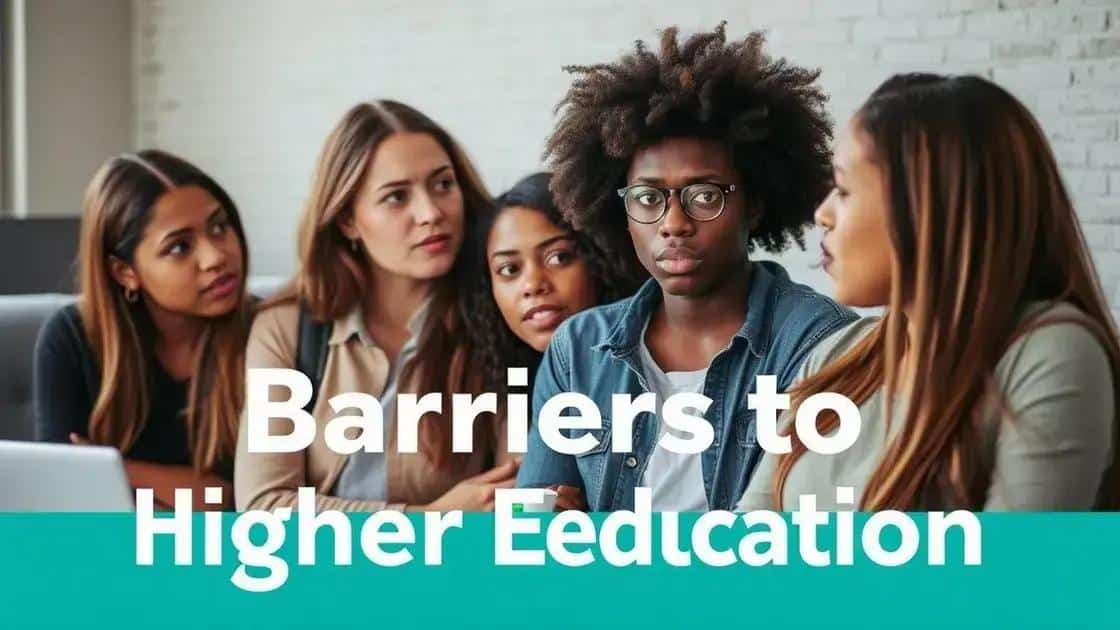Access to higher education: unlocking opportunities for success

Access to higher education provides individuals with increased earning potential, enhanced career opportunities, and personal growth, making it a significant factor for long-term success in today’s society.
Access to higher education is a pivotal aspect of personal and professional growth in today’s society. Have you ever wondered how this educational access can shape your future? Let’s dive into its significance and explore the pathways available.
Understanding the importance of higher education
Understanding the importance of higher education is crucial for both personal growth and career opportunities. It is not just about obtaining a degree but also about gaining skills and knowledge that can significantly impact your life.
Why Higher Education Matters
For many, higher education serves as a stepping stone to better employment prospects. Graduates often enjoy higher salaries and lower unemployment rates compared to those without a degree. Let’s take a look at some of the key benefits:
- Enhanced critical thinking skills
- Broader career options available
- Access to networking opportunities
- Increased earning potential over a lifetime
Furthermore, the value of higher education extends beyond financial aspects. It enriches your knowledge base, fosters personal development, and encourages a sense of community and belonging.
Overcoming Misconceptions
Some people believe that attending a university is not necessary for success. However, studies show that individuals with higher education are more likely to be engaged in their fields and contribute positively to society. It helps build confidence and independence.
In addition, the experiences gained during your college years can shape your worldview. Interacting with a diverse group of individuals cultivates tolerance and understanding, which are essential in today’s global society.
Ultimately, higher education is a powerful tool for personal and professional advancement. Whether you pursue a four-year degree, an associate degree, or vocational training, the journey towards education can open doors to opportunities you might never have imagined before.
Barriers to accessing higher education

The barriers to accessing higher education can be numerous and complex. Many students face challenges that hinder their ability to pursue their educational goals. Understanding these obstacles is the first step towards overcoming them.
Financial Constraints
One of the most significant barriers is the cost of tuition and related expenses. Many families struggle with the financial burden of college, which can include tuition, books, and living costs. Scholarships and financial aid are available, but they may not cover all expenses. This often leads students to forgo their dream of attending college.
- High tuition fees
- Lack of financial aid resources
- Costs of textbooks and supplies
- Living expenses during study
Additionally, students from low-income backgrounds may not have access to financial planning resources that help maximize their aid opportunities.
Academic Preparedness
Another barrier can be academic readiness. Some students may not feel prepared for the demands of a college curriculum. This can be influenced by the quality of education received in high school. For instance, students who attend underfunded schools may lack access to advanced coursework and college counseling services.
This lack of preparation can lead to lower confidence and increased anxiety about college performance. When students feel unprepared, they might choose to delay or abandon their pursuit of a degree entirely.
Social factors also play a role. Peer pressure and family expectations can discourage some individuals from seeking higher education. In certain communities, the focus may lie more on immediate employment rather than long-term educational aspirations, which can perpetuate cycles of limited opportunity.
Addressing these barriers requires a concerted effort from schools, policymakers, and communities to ensure that all students have the chance to pursue their dreams in higher education.
Strategies for overcoming educational challenges
Strategies for overcoming educational challenges are essential for students aiming to access higher education. Many face obstacles, but with the right approaches, these barriers can be navigated successfully.
Utilizing Resources
One effective strategy is to utilize available resources. This includes seeking help from teachers and academic advisors who can provide guidance. Students should be proactive in asking questions about their studies and available programs. Libraries and online platforms also offer valuable materials that can enhance learning.
- Attend tutoring sessions for extra help
- Join study groups with peers
- Use online educational resources and websites
- Participate in workshops offered by schools
In addition, many educational institutions offer counseling services that assist with both academic and personal challenges, allowing students to focus on their studies.
Setting Achievable Goals
Another important strategy is to set realistic and achievable goals. Breaking down larger tasks into smaller, manageable steps can help students make progress without feeling overwhelmed.
For example, instead of aiming solely for a high GPA, students can focus on mastering specific subjects or skills. This approach builds confidence and encourages a sense of accomplishment with each completed task, making the overall goal more reachable.
Additionally, maintaining a positive mindset plays a crucial role. Surrounding oneself with supportive friends and family can make a significant difference. It’s essential to remember that challenges are part of the learning process and can lead to growth.
For those facing financial challenges, seeking out scholarships and financial aid can alleviate some of the burdens. Many organizations and institutions provide funding specifically designed to support students from diverse backgrounds.
The long-term benefits of higher education

The long-term benefits of higher education extend beyond just obtaining a degree. Graduating can lead to numerous opportunities that positively impact an individual’s life for years to come.
Career Advancement
One major advantage is career advancement. Graduates often have access to better job positions and higher salaries. Research shows that individuals with a college degree tend to earn significantly more over their lifetimes compared to those without one.
- Higher starting salaries
- More job security
- Access to higher-level positions
- Increased opportunities for promotions
In addition to higher earnings, individuals with higher education often experience lower unemployment rates. Employers frequently prefer candidates with degrees, seeing them as more qualified and capable.
Personal Growth and Development
Beyond financial benefits, higher education contributes to personal growth. It fosters critical thinking, problem-solving skills, and a deeper understanding of the world. Students are encouraged to engage with diverse ideas, enhancing their ability to think independently.
Moreover, pursuing a degree can lead to lasting friendships and professional networks. Connections made during college can open doors to job opportunities and collaborations in the future.
Lastly, the experiences gained during college, including internships and study abroad programs, can provide invaluable skills that are highly sought after in the job market.
Ultimately, the long-term benefits of higher education encompass more than just the immediate outcomes. They positively shape one’s career trajectory, personal development, and overall quality of life.
FAQ – Frequently Asked Questions about Access to Higher Education
What are the main benefits of higher education?
The main benefits include higher salaries, better job opportunities, personal growth, and strong professional networks.
How does higher education impact earning potential?
Individuals with higher education typically earn more over their lifetimes than those without a degree, leading to financial stability.
What challenges do students face when pursuing higher education?
Students may encounter financial constraints, lack of academic preparedness, and social pressures that can hinder their educational goals.
How can students overcome barriers to education?
Students can utilize available resources, set achievable goals, seek support from mentors, and look for scholarships to aid their educational journey.






